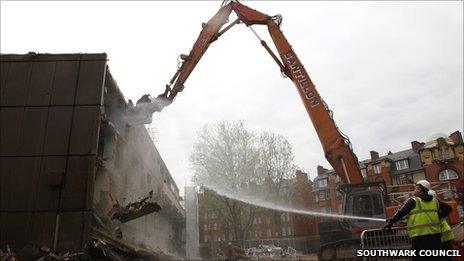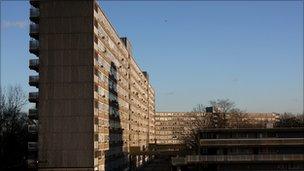'Muggers' paradise' the Heygate Estate is demolished
- Published

The estate once housed 3,000 people
Work to demolish a notorious south-east London council estate has begun.
Most of the residents of the the Heygate Estate, which once housed 3,000 people, started moving out in 2008.
Now the bulldozers have moved in.
While the demolition and regeneration will signal the start of something new for Elephant and Castle, it might also mark the end of the 1970s dream of communal living.
Rats left first
James Smith, 63, lived on the estate with his wife Margaret for 22 years, but moved to Nunhead in December 2010.
"Out of 200 flats on our block, there were only four people left when we were still there - the rats left before the tenants did.
"At the time it worked, but in this day and age it doesn't," he said. "In the later stages these stairwells were like a muggers' paradise. It was terrible.
"You couldn't go out at night, your life was under a constant threat."
Southwark Council said 98 units on the Rodney Road side of the estate were being dismantled on Friday. More demolition will follow in the next few weeks, before some of the larger blocks are brought down in May.
The entire estate will be knocked down in less than a year, as part of a 15-year, £1.5bn regeneration of Elephant and Castle, that will create 5,300 new homes, shops, and public spaces.
Eleven of the properties are still occupied, mainly by people still negotiating with the council.
The Heygate found notoriety as a backdrop for the gritty film Harry Brown, which starred Michael Caine.
It is also close to the Aylesbury estate, where Tony Blair famously made his first speech as prime minister in 1997.
The sprawling estate, with its concrete blocks, galleys and walkways, was designed in the 1960s by Tim Tinker and construction was completed in the 1970s.
The futuristic buildings were designed to offer a utopian ideal where communal living provided a social hub for those who became the first to benefit from the post-war welfare state.

The Heygate Estate formed the backdrop to Michael Caine film Harry Brown
But Southwark Council said the estate's stairwells and dark alleys actually turned into areas which encouraged crime and anti-social behaviour.
Architectural writer Stephen Games said while some people would be sad to see the estate demolished, architectural aims have changed since it was built.
"There's a sense that it makes you all the same, that you are not an individual," Mr Games said. "Now a lot of architects want to individualise everything."
"I think the buildings are horrible."
The council also said the estate had become increasingly expensive to maintain and heat.
Rob Deck, Lend Lease project director for Elephant and Castle, said it "is one of the most significant regeneration projects in Europe".